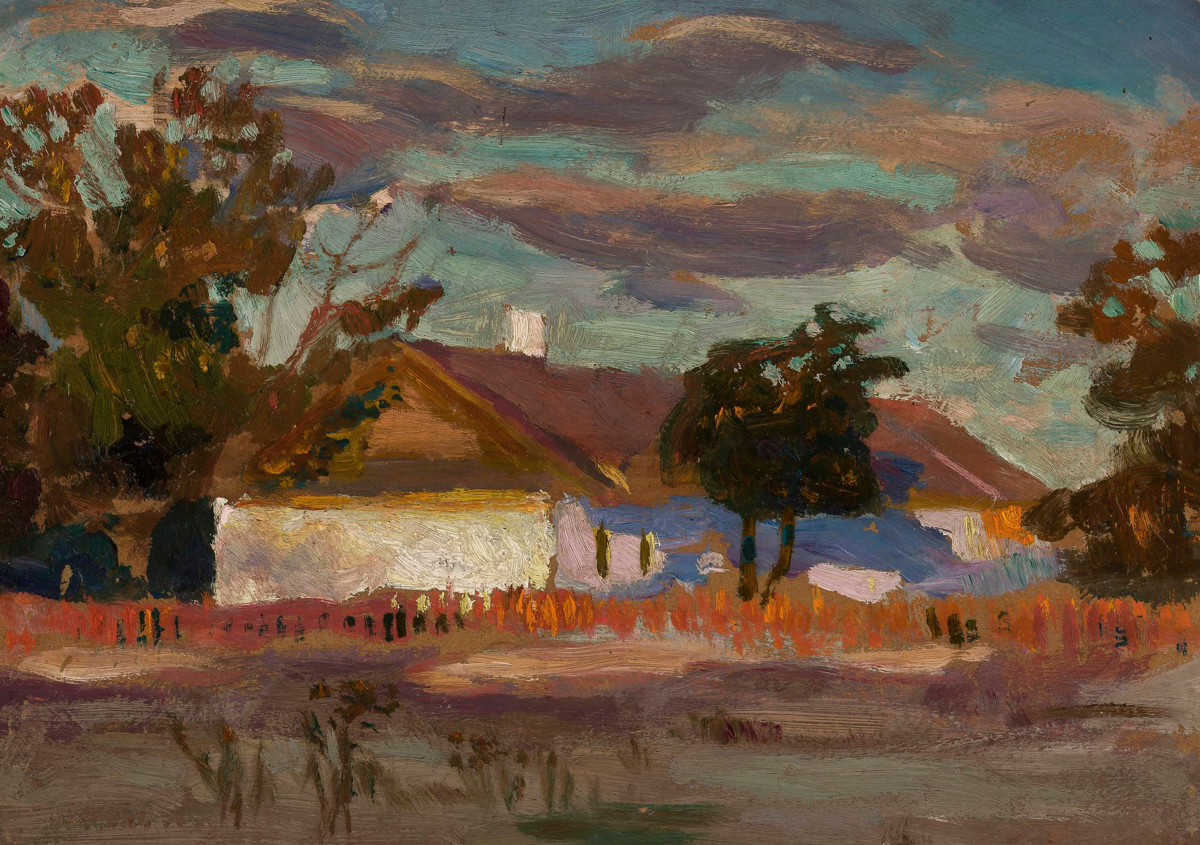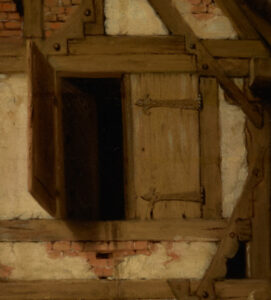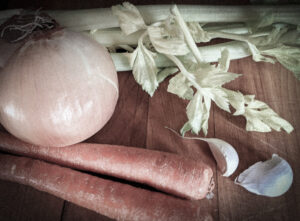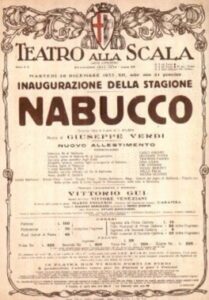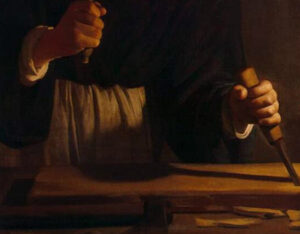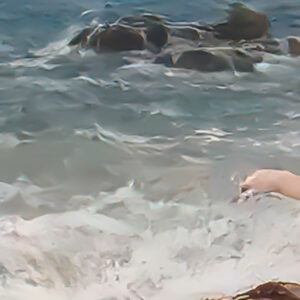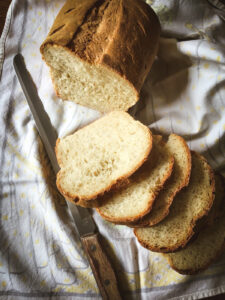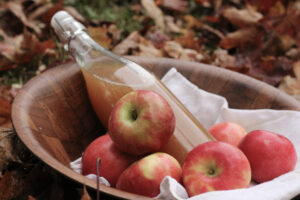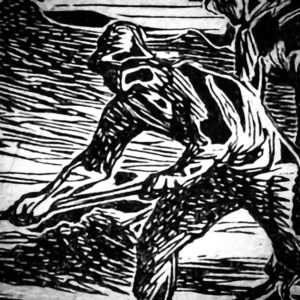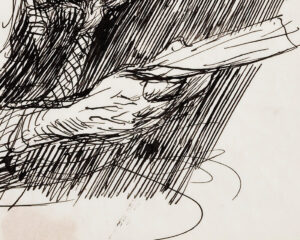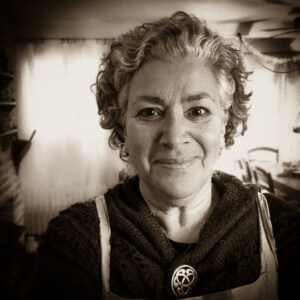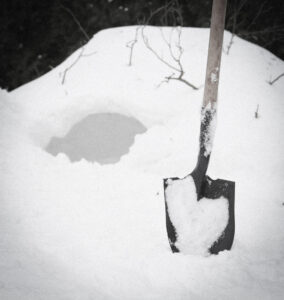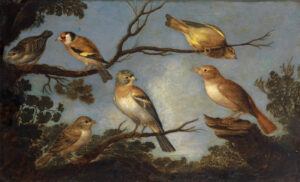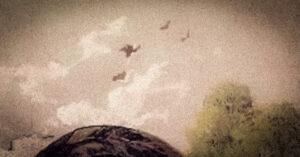Powerless

Mrs. Carmel Richardson
Crack. Crash! Another enormous pine limb fell in my neighbor’s yard, landing atop the project car parked in his driveway. It was coated, from sappy bark to fir-fronded tip, with thick ice, warped and wibbly like an old church’s basement window.
The freezing rain had started just before dawn that morning, and continued, improbably, through the early afternoon, the temperature hovering at a perfect thirty-two to catch each grass blade and budless twig in glass. It wasn’t until nature exploded, whole tree limbs bursting from their trunks in loud and destructive emancipation under the weight of the ice, that it occurred to me we might be in for more than slick yards. “We’re probably going to lose power,” I texted my husband, who was traveling for work, upon seeing the neighbor’s car lumped. And sure enough, a few hours later, the murmur of electricity I had forgotten to hear went silent. I blinked in the sudden darkness.
The whole town was out, and most of the county, and would remain so for several days. Maps of the surrounding region showed large patches entirely black: our street was dark for forty-eight hours, while others were without power for a full week. Some friends with private wells lost water, too. And while the event didn’t have a fraction of the death and devastation of the 2021 Texas power outage, the darkness lasted long enough, and the February nights were cold enough, to give an edge to things.
It occurred to me more than a few times how generally fragile we were—my little family, but also the whole modern electric infrastructure, which, like my neighbor’s car, had been so deftly lumped by a few hours of freezing rain. The region struggled for weeks, under the work of many hands, before returning to its former capacity. In a sense, it made the whole premise of modern life feel like a stage drama, and here the curtain had been pulled back to reveal all the tangled pulleys and levers that made the thing look alive. Nature had broken through the fourth wall, and all the stagehands were scrambling to put her back. (Somehow, in all of this, Amazon’s trucks were unassailable, trundling through the neighborhood like clockwork.)
Nature had broken through the fourth wall, and all the stagehands were scrambling to put her back.
Without the aid of forced heat, the walls of our house did little to keep out the chill. Many of my efforts at homemaking during this crisis were also rather futile. I blithely asked a friend about borrowing a space heater. She replied, in good humor, “Yes, two electric ones.” A pause. “Do you have a generator?” We did not. Which meant, among other things, the food I had stored for such emergencies was slowly thawing behind the freezer door, while my fingers and toes seemed to do just the opposite, in the ambient forty-nine degrees of our kitchen.
By Hour Twenty-Four, the situation was getting to be more than unpleasant. My eight-month-old daughter was sleeping poorly, bundled with every spare blanket we owned and in breach of every safe sleeping rule on the books. Grocery stores were still closed, incapable of running a credit card and apparently unfamiliar with the concept of cash. Meanwhile, the storm had caught us at a low point in the ebb and flow of our provisions, as we had been eating up space in the freezer to make way for a quarter of a cow’s arrival that weekend. (Providentially, the cow butchering was delayed until after we regained power.) I had run the car a few times, both to charge my phone and to get warm for a spell, but gas was a precious commodity. To fill my tank, I would need to drive out of town and beyond the several surrounding ones to get to the nearest open gas station.
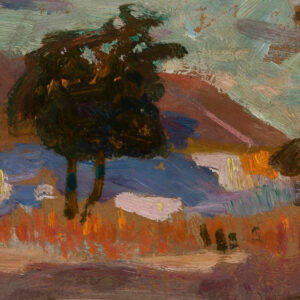 Instead, I threw in the towel. Cold and in poor spirits, with my husband still far from home, I packed the car with my daughter and my toothbrush, and drove to stay with my (aforementioned) friend and her generator on the outskirts of town.
Instead, I threw in the towel. Cold and in poor spirits, with my husband still far from home, I packed the car with my daughter and my toothbrush, and drove to stay with my (aforementioned) friend and her generator on the outskirts of town.
Out there, the crisis seemed much less intimidating. These friends and their neighbors had systems in place to handle it, running their well water lines on power generators that also kept the furnace and freezer humming. “Folks out here live for moments like this,” one of her neighbors told me, and it seemed to be true. Since I was benefiting from it by way of a cozy living room and a warm chocolate chip cookie, I was very glad that they did.
In addition to their physical preparedness, these men and women, many of them farmers, seemed less fazed by even the uncontrollable wildness at hand. It was as though in making their lives alongside the natural seasons they had learned that there is a rationale to the broader constitution of nature, one which is not to be hid from, but husbanded and even imitated. Behind the curtain, outside the thin walls in which we did our work by lamplight, the months of cold and dark were giving the ground a rest, making it more fertile for seasons of growth. Bugs were hibernating, pregnant animals nesting, and dormant bulbs and budless branches were continuing unhindered — a permanent ecosystem that undergirded the flimsy one I had constructed. Even the angle of the tree limbs, with the newer, fragile shoots pointing upward, less vulnerable to breakage, while the more mature ones bowed outward, protected the trees themselves from worse storm damage, a virtue the power lines could not boast.
Bugs were hibernating, pregnant animals nesting, and dormant bulbs and budless branches were continuing unhindered — a permanent ecosystem that undergirded the flimsy one I had constructed.
With a view of nature’s wildness as intentional, even if those intentions weren’t always visible, these families were not simply trying to keep the natural world out of their homes: The dirt, bugs, vagrant animals, and extreme weather of many types were part of life to be understood and worked with, rather than a problem to be fixed. Indeed, to interfere too much would be to upset these natural processes, to cut a thread only because you couldn’t see that it held the thing together.
Still, some active role was necessary: Pruning made the herbs grow stronger. Perhaps the fallen branches were a kind of pruning, too.
Sustaining life gets right to the purpose of homemaking; it was the bullseye I had been casting about in the dark for, only I didn’t realize my haphazardness until well after the plug had been pulled. But in the darkness, paradoxically, I could finally see a dim light. The chickens and the sourdough and the canning and the raw milk were all good not just for their own sake, and surely not just for the sake of some trendy hobby, but because they got at the larger goal of providing for our people, a need that only grows in an ice storm—or any instance when the veil between modern life and the wilder reality is suddenly torn. 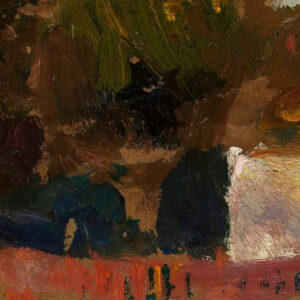 This part I knew. But that preparedness was twofold, both material and spiritual. It took a two-day power outage to admit that I had really only gotten about half of the first part and none of the second. Beyond furnishing our home with a generator and a propane tank and half a dozen wool blankets, I would need to acquire some of this spiritual grit, to see homemaking not merely as building a fortress, or a museum of modern convenience, which may or may not remain standing amid the ruins of a cataclysm, but as something more organic. I would need to angle my branches upward, so they would not crack under the ice.
This part I knew. But that preparedness was twofold, both material and spiritual. It took a two-day power outage to admit that I had really only gotten about half of the first part and none of the second. Beyond furnishing our home with a generator and a propane tank and half a dozen wool blankets, I would need to acquire some of this spiritual grit, to see homemaking not merely as building a fortress, or a museum of modern convenience, which may or may not remain standing amid the ruins of a cataclysm, but as something more organic. I would need to angle my branches upward, so they would not crack under the ice.
It would be easy to conclude this story with a moral about the harshness of the natural world, and our helplessness as we stand before it. It would be pleasantly dramatic to say, as Percy Bysshe Shelley said, that “The wilderness has a mysterious tongue/Which teaches awful doubt.” But I do not believe this to be true, because, though I am no farmer and only a novice homemaker, I have seen what is possible when man and nature work together, when we relinquish our sense of autonomous power, when we join harmoniously with the rest of the created world instead of hiding from it or setting ourselves in battle against it. And I have also seen what happens after the ice melts.
It is summer now, and something miraculous has occurred. The cold earth has opened up its mouth, not to swallow prey, but to birth green grasses and flowers everywhere. The natural world has once again exploded, not with ice this time, but soft, verdant splendor. Here is a system, thousands of times more complex than that of our electrical grid, which has never once been powerless.

